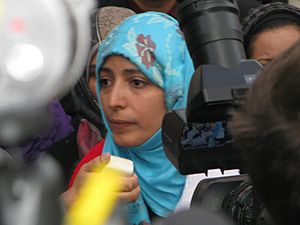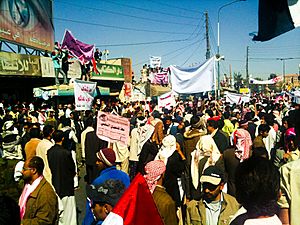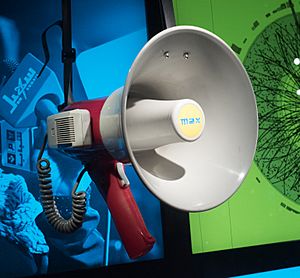Tawakkol Karman facts for kids
Quick facts for kids
Tawakkol Karman
|
|
|---|---|
| توكل كرمان | |
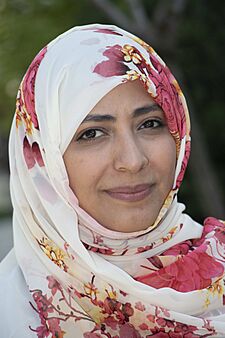
Karman in 2012
|
|
| Born | 7 February 1979 Taiz Governorate, Yemen Arab Republic
|
| Nationality | Yemeni |
| Citizenship |
|
| Alma mater | University of Massachusetts Lowell Sanaa University |
| Occupation | Journalist Politician Human rights activist Revolutionary |
| Movement | Jasmine Revolution |
| Spouse(s) | Mohammed Al-Nehmi |
| Children | 4 |
| Parent(s) | Abdulsalam Khaled Karman (Father) Anisah Hussein Abdullah Al Aswadi (Mother) |
| Relatives | Eshraq Karman (sister) Entesar Karman (sister) Mohameed Karman (brother) Khaled Karman (brother) Hakimah Karman (sister) Tariq Karman (brother) Khadejah Karman (sister) Huda Karman (sister) Safa Karman (sister) |
| Awards | Nobel Peace Prize (2011) |
Tawakkol Karman (born February 7, 1979) is a Yemeni journalist, politician, and human rights activist. She is known for her work promoting freedom of the press and human rights in Yemen. She helped start a group called 'Women Journalists Without Chains' in 2005.
Tawakkol Karman became a well-known figure during the 2011 Yemeni uprising, which was part of the larger Arab Spring movement. People in Yemen sometimes called her the 'Iron Woman' or the 'Mother of the Revolution'. In 2011, she received the Nobel Peace Prize for her peaceful efforts to protect women and ensure they could fully participate in building peace. She was the first Yemeni, the first Arab woman, and the second Muslim woman to win a Nobel Prize.
Karman became famous in Yemen after 2005 for speaking up about press freedom. She led protests when a mobile phone news service was not given a license in 2007. After May 2007, she organized weekly protests asking for bigger changes in Yemen. In early 2011, she joined the Arab Spring movement, inspired by the revolution in Tunisia. She strongly spoke out against the government of President Ali Abdullah Saleh.
Contents
About Tawakkol Karman
Tawakkol Karman was born on February 7, 1979, in Shara'b As Salam, a district in Taiz Governorate, North Yemen. She grew up near Taiz, which is Yemen's second-largest city and known for its schools. Her father, Abdel Salam Karman, was a lawyer and politician. He served as the Legal Affairs Minister in the government before he resigned.
Tawakkol has several siblings, including Tariq Karman, a poet, and Safa Karman, a lawyer and journalist for Al-Jazeera. Tawakkol is married to Mohammed al-Nahmi and they have three children.
She earned a master's degree in international security from the University of Massachusetts Lowell. She also has degrees in commerce and political science from Yemeni universities. In 2012, she received an honorary doctorate in International Law from the University of Alberta in Canada.
During a protest in 2010, Tawakkol Karman faced an attack, but her supporters protected her. In 2011, she also received a threat from a high-ranking Yemeni official, telling her to stop her protests. The Turkish government offered her Turkish citizenship, which she accepted in 2012.
In 2012, Karman spoke at the Clinton Global Initiative. In 2019, she was honored as the Social Entrepreneur of the Year at The Asian Awards. Like many Yemenis, she had to leave Yemen after the Houthi group took control of the capital, Sana'a. From her home in Istanbul, she continues to speak out against problems in Yemen. In 2020, Houthi rebels raided her home and office.
Women Journalists Without Chains
Tawakkol Karman co-founded the human rights group Women Journalists Without Chains (WJWC) in 2005. She started it with seven other female journalists. Their goal was to promote human rights, especially freedom of speech and democratic rights.
The group was first called "Female Reporters Without Borders." They changed the name to get a government license. Karman said she faced threats and harassment from Yemeni authorities because the government refused to license WJWC's newspaper and radio station.
The group also fought for freedom for SMS news services. These services were controlled by the government, even though they weren't covered by the Press Law. WJWC's own news service, Bilakoyood, was the only one not allowed to continue operating. In 2007, WJWC released a report showing how press freedom had been abused in Yemen since 2005. Karman also criticized the government for putting journalists on trial. From 2007 to 2010, she regularly led protests in Tahrir Square, Sana'a.
Tawakkol Karman was also a member of the Yemeni Journalists' Syndicate. In 2019, she called for a worldwide agreement to end violence against women.
Her Views and Actions
Karman began her protests by advocating for press freedoms in Yemen. She believed that freedom of expression was very important. She was a senior member of the Al-Islah party but was later suspended in 2018. This happened after she accused a Saudi-led group of acting like occupiers in Yemen.
She stopped wearing the traditional niqab, which covers the whole face. Instead, she chose colorful hijabs that showed her face. She explained that the full covering was a cultural choice, not a religious rule. She told the Yemen Times in 2010 that women should become part of the solution and be active without needing permission. She believed this was how Yemen could reach its full potential.
Karman has also spoken about problems like malnutrition among girls and high rates of illiteracy, where two-thirds of Yemeni women cannot read. She supports laws to prevent girls younger than 17 from getting married. She believes Yemen's revolution was not just about politics but also about fixing societal problems like child marriage.
She has led protests against government corruption. She also says she remains independent from foreign influences. She believes in human rights for everyone, saying, "I am a citizen of the world. The Earth is my country, and humanity is my nation."
She supports the Palestinian people in the Israeli-Palestinian conflict. In May 2024, she said the world was silent about the violence against Palestinians in Gaza.
Views on Conflicts
Tawakkol Karman has spoken out against both the Houthi group and Al-Qaeda in Yemen. She sees them as threats to Yemen's independence. She has accused the Houthis of getting help from the Iranian government. She believes there should be no integration of the Houthis into the Yemeni military if they do not give up their weapons. She thinks former President Saleh and the Houthi rebels worked together to undo the 2011 revolution. Despite the civil war, Karman remains hopeful for Yemen's future.
Karman often criticizes the use of drones by the U.S. in Yemen. She calls them "unacceptable" and says they violate human rights. She believes these bombings make more people join Al-Qaeda. She also condemned the Saudi-led military action in Yemen, calling for an immediate stop to the air strikes.
2011 Protests
During the 2011 Yemeni protests, Tawakkol Karman organized student rallies in Sana'a against President Saleh's long rule. On January 22, she was arrested and held for 36 hours before being released. She later wrote that her arrest became a key moment in the Yemeni revolution, leading to more protests across the country.
After her release, she led another protest on January 29, calling for a "Day of Rage" on February 3. This was similar to protests in Egypt and Tunisia. She was arrested again on March 17 during ongoing protests. She stated that they would continue until Saleh's government fell. She and her husband stayed at the protest camp for months.
Karman explained that the protests happened because of a mix of dictatorship, corruption, poverty, and unemployment. She said it was like a volcano exploding due to injustice.
She had some disagreements with other protest organizers, especially when she urged protesters to march to the Presidential Palace in May after security forces killed 13 protesters.
In June 2011, she wrote an article in The New York Times called "Yemen's Unfinished Revolution." In it, she criticized the United States and Saudi Arabia for supporting the "corrupt" Saleh government. She argued that American involvement was focused on fighting terrorism, not on human rights or Yemen's democracy movement. She said that Yemeni protesters also wanted stability. She credited Tunisia for inspiring the Arab Spring protests across the Middle East.
During the protests, many women, up to 30 percent of the protesters, were active in demanding change. On October 16, a woman was killed in Taiz. Ten days later, women in Sana'a protested the violence by burning their makrama (headscarves). Karman said this showed that Yemeni women were rejecting injustice and would no longer hide.
Working with International Groups
After winning the Nobel Peace Prize, Tawakkol Karman worked to get international support for the protesters. She wanted to remove Saleh from power and hold him accountable.
She asked the United Nations Security Council and the United States not to pardon Saleh but to freeze his money and support the protesters. On October 21, the UN Security Council condemned Saleh's government for using deadly force. However, it also supported a plan that would give Saleh immunity if he resigned. Karman criticized this, saying Saleh should face trial at the International Criminal Court.
Karman also met with U.S. Secretary of State Hillary Clinton on October 28. Clinton said the U.S. supported a democratic change in Yemen. Karman responded that the U.S. administration was giving guarantees to Saleh instead of valuing the sacrifices of the Yemeni people.
Saleh eventually signed the agreement on November 23, 2011, in Saudi Arabia. He transferred his powers to the Vice President to begin a political transition.
Nobel Peace Prize
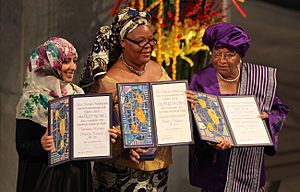
Tawakkol Karman, along with Ellen Johnson Sirleaf and Leymah Gbowee, received the 2011 Nobel Peace Prize. They were honored "for their non-violent struggle for the safety of women and for women's rights to full participation in peace-building work." The Nobel Committee noted that Karman played a leading role in fighting for women's rights, democracy, and peace in Yemen. They also mentioned a UN resolution that says women must have a bigger role in peacemaking.
Karman was the first Arab woman and the youngest person at that time to win the Nobel Peace Prize. She was also the second Muslim woman to receive it.
When the award was announced, the committee chairman said that democracy and lasting peace need women to have the same opportunities as men. He called the prize "a very important signal to women all over the world." The prize money, 10 million Swedish kronor, was divided equally among the three winners.
Karman was surprised by the award. She said it was a victory for Arabs and Arab women everywhere. She dedicated the award to all the young people and women across the Arab world who fought peacefully for their rights and freedoms.
After the Nobel Prize
After winning the prize, Karman traveled to Qatar. She met with Sheikh Tamim bin Hamad Al Thani. She also asked for help to set up a TV and radio station called Belqees TV, named after the Queen of Sheba. This station would support female journalists and educate Yemeni journalists. She is also on the advisory board of the MBI Al Jaber Media Institute in Yemen, which offers free journalism training.
She was named the top global thinker of 2011 by Foreign Policy magazine. She has also given scholarships to Yemeni students to study at Istanbul Aydın University. Karman has spoken at many colleges and universities around the world about women's rights and the Arab Revolution.
In 2019, it was found that Karman had been targeted by a secret surveillance operation. This operation used a special spying tool to hack her iPhone.
Documentary Film
Yemeni filmmaker Khadija al-Salami made a documentary film in 2012 called The Scream. This film showed the important role women played in the Yemen uprising. Tawakkol Karman was interviewed in the film. The movie highlights three women: a journalist, an activist, and a poet. The title refers to women speaking out against traditional society. The Scream was first shown at the Dubai International Film Festival in 2012.
Helping Others
On February 13, 2023, Tawakkol Karman and the Turkish Disaster and Emergency Management Presidency (AFAD) built 50 temporary shelters. These shelters were for victims of the big earthquake that hit Turkey and Syria in February 2023. Her foundation also sent aid to the earthquake-affected areas.
See also
 In Spanish: Tawakkul Karman para niños
In Spanish: Tawakkul Karman para niños
 | Bayard Rustin |
 | Jeannette Carter |
 | Jeremiah A. Brown |


